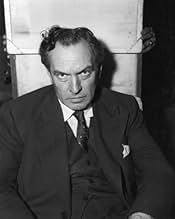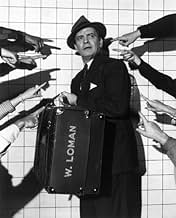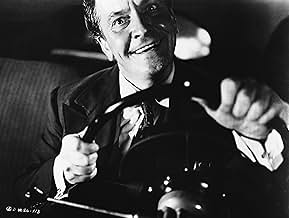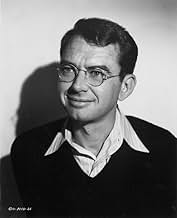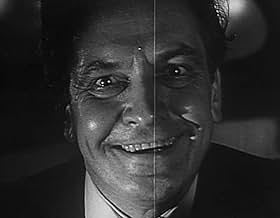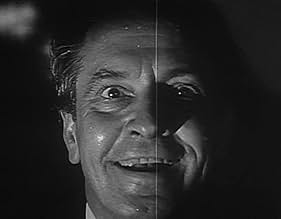IMDb-BEWERTUNG
7,2/10
1285
IHRE BEWERTUNG
Füge eine Handlung in deiner Sprache hinzuAn over-the-hill salesman faces a personal turning point when he loses his job and attempts to make peace with his family.An over-the-hill salesman faces a personal turning point when he loses his job and attempts to make peace with his family.An over-the-hill salesman faces a personal turning point when he loses his job and attempts to make peace with his family.
- Regie
- Drehbuch
- Hauptbesetzung
- Für 5 Oscars nominiert
- 8 Gewinne & 11 Nominierungen insgesamt
Beverly Aadland
- Girl
- (Nicht genannt)
Jeanne Bates
- Mother
- (Nicht genannt)
Gail Bonney
- Mother
- (Nicht genannt)
Roger Broaddus
- Boy
- (Nicht genannt)
Paul Bryar
- Subway Guard
- (Nicht genannt)
Patricia Edwards
- Letta
- (Nicht genannt)
Elisabeth Fraser
- Miss Forsythe
- (Nicht genannt)
Charles Morton
- Subway Passenger
- (Nicht genannt)
Empfohlene Bewertungen
Arthur Miller justifiably received a lot of acclaim for his Broadway stage version of DEATH OF A SALESMAN and this film version starring FREDRIC MARCH as Willie Loman is a faithful transfer of that work.
March is outstanding in his portrayal of a bitterly confused man who can't fathom why his life went so wrong, and CAMERON MITCHELL and KEVIN McCARTHY do outstanding work as the sons who are disillusioned by their father's failure. But the most memorable performance, in my estimation, comes from MILDRED DUNNOCK, who would go on to play similarly bitter women in her future roles on screen. But here she is poignant in what has to be one of the best character roles she ever had.
Surprisingly, the film is little seen today, seldom revived and largely forgotten. BRIAN DENNEHY did have success in a recent Broadway version and DUSTIN Hoffman has performed the role on TV. But the Fredric March version deserves to be seen, however heavy-handed the material is.
It's an exhausting experience, a story of one man's failure in life's journey, but dramatically very effective and it still has a lot to say.
March is outstanding in his portrayal of a bitterly confused man who can't fathom why his life went so wrong, and CAMERON MITCHELL and KEVIN McCARTHY do outstanding work as the sons who are disillusioned by their father's failure. But the most memorable performance, in my estimation, comes from MILDRED DUNNOCK, who would go on to play similarly bitter women in her future roles on screen. But here she is poignant in what has to be one of the best character roles she ever had.
Surprisingly, the film is little seen today, seldom revived and largely forgotten. BRIAN DENNEHY did have success in a recent Broadway version and DUSTIN Hoffman has performed the role on TV. But the Fredric March version deserves to be seen, however heavy-handed the material is.
It's an exhausting experience, a story of one man's failure in life's journey, but dramatically very effective and it still has a lot to say.
I recently have discovered Fredric March and have been watching several of his movies. Though I personally prefer his early films where he was the young and romantic hero, I found this movie to be a very good example of how broad his acting talent was. He was simply amazing as Willy Loman; he impressed me as being a truly desperate man at the end of his sanity. He should have been the one to win best actor during this year; instead it went to Humphrey Bogart for "The African Queen". Why, I don't know, for Fredric March's portrayal of Willie Loman was excellent. It brought tears to my eyes at the end,and I am not one to cry during a film; it takes something special for an actor to move me to tears.
The whole film had a darkness to it, it was very melancholy, depressing, desperate, hopeless...it is an emotionally exhausting film to watch. It does not leaving you sighing happily at the end. Still, I recommend you watch it for a wonderful performance by Fredric March.
The whole film had a darkness to it, it was very melancholy, depressing, desperate, hopeless...it is an emotionally exhausting film to watch. It does not leaving you sighing happily at the end. Still, I recommend you watch it for a wonderful performance by Fredric March.
For reasons unknown to me, this version of the film has been unavailable for years. When I finally was able to view it recently, I thought it was excellent, and that Frederic March was the ideal Willy Loman. Played on Broadway by Lee J. Cobb, George C. Scott and Brian Dennehy, powerful men with powerful presences, the role has the potential to make Willy's downfall extremely dramatic, a testament to how far the mighty can fall. But in Frederic March, we better see his inherent weakness, and believe his corruption. We're not tricked into believing that his life's work was ever worthwhile, that it just fell on hard times. Instead, we see that his life was a lie from the beginning, which is what I believe the play intends.
Dustin Hoffman, another great actor, also famously played the role on Broadway and in the TV version of that production, widely available on video and therefore perhaps the version most viewers are familiar with. His interpretation was quirky and unreal, a character actor playing the lead in a modern take on a Greek tragedy, and it didn't work for me. But no matter how you feel about the play and the role, if you can catch this Frederic March version, do so; you won't regret it.
Dustin Hoffman, another great actor, also famously played the role on Broadway and in the TV version of that production, widely available on video and therefore perhaps the version most viewers are familiar with. His interpretation was quirky and unreal, a character actor playing the lead in a modern take on a Greek tragedy, and it didn't work for me. But no matter how you feel about the play and the role, if you can catch this Frederic March version, do so; you won't regret it.
I saw this film upon its release in 1951, and although only 12 at the time and surely unable to grasp some of the finer psychological points of the drama, I was a pretty 'old' 12 and was already an absolute devotee of fine acting on the screen, having gone to the movies in that pre-TV era 7 days a week from the age of 8 (my favorite actor was Claude Rains). I was mesmerized by Fredric March's performance then, and I still am now, even after seeing Lee J. Cobb, Brian Dennehy, Dustin Hoffman and a few others as Willy Loman. Every other version of the play I have seen seems to fall short in one way or another when compared to this one. There are some errors in other reviews that should be noted in passing: Two of them make reference to this as a TV movie, but it was a regular theatrical release and played the usual movie house circuit of the time. Another states that the film was picketed by the American Legion due to Miller's testimony before HUAC. I can't speak to the picketing, but I certainly don't recall any such thing, and Miller's problems with HUAC came several years after the film played the circuits. Lastly, to this day I do believe that March, Dunnock and McCarthy should have won Academy Awards for their performances. March was beaten out by Humphrey Bogart in "The African Queen", a worthy contender to be sure but one I clearly recall being given more on the basis of the unusual character (for him) played by Bogart. But it was the Year of "Streetcar Named Desire", and if Bogart had not won it, surely it would have gone to Marlon Brando. March had already won two of them and, outside Walter Brennan, no one had won three AAs up to 1951. Dunnock and McCarthy were certainly more impressive than the excellent Kim Hunter and Karl Malden in their respective films and supporting roles. As I said, this was the Year of "Streetcar Named Desire". March was one of the greatest American actors of the 20th century, and incredibly versatile, and of all the true 'star' Hollywood actors of his time, he and Paul Muni had by far the most illustrious stage careers concurrent with their film successes, something that meant a lot more then than it does now. Anyway, this is THE film version of this play, much in the same way that no other version of "Of Mice and Men" really holds up to the Meredith-Chaney version, no matter how hard subsequent versions try!
This is the version people of my generation grew up on; it played on TV in the 50's, and being black and white non-widescreen and uncensorable, what we saw was what was filmed. Frederick March hammmed it up a bit, but in retrospect the play itself is hammmy (emotion-charged). It has been said Arthur Miller disliked the film, particularly the realistic representation of Willie's reveries and imaginings. Kevin McCarthy did a fine job as Biff. I loyally refused for years to watch Dustin Hoffman's version, but when I finally gave in I enjoyed his substantially different interpretation. But if he differed from March, then it follows March differs from him. In short, a whole other way of enjoying the greatest American soap opera ever penned.
Wusstest du schon
- WissenswertesAccording to Arthur Miller, in a 2000 essay entitled, "Are You Now Or Were You Ever?" Columbia asked Miller to sign an anti-Communist declaration to ward off the threat of picket lines by the American Legion at theaters showing "Death of a Salesman". He refused. Instead, Columbia made another movie, a short film entitled "Life of a Salesman" to be shown with it. The short consisted of business professors from City College praising sales as a profession, and denouncing the character of Willy Loman. Miller wrote: "Never in show-business history has a studio spent so much good money to prove that its feature film was pointless."
- VerbindungenFeatured in Kaufen für die Müllhalde (2010)
Top-Auswahl
Melde dich zum Bewerten an und greife auf die Watchlist für personalisierte Empfehlungen zu.
- How long is Death of a Salesman?Powered by Alexa
Details
- Erscheinungsdatum
- Herkunftsland
- Offizieller Standort
- Sprache
- Auch bekannt als
- Death of a Salesman
- Produktionsfirma
- Weitere beteiligte Unternehmen bei IMDbPro anzeigen
- Laufzeit
- 1 Std. 48 Min.(108 min)
- Farbe
- Seitenverhältnis
- 1.37 : 1
Zu dieser Seite beitragen
Bearbeitung vorschlagen oder fehlenden Inhalt hinzufügen

